The Baule are originally part of a breakaway group of the Akan people from Ghana. In the 17th century, Queen Abla Pokou led a group on an exodus away from the main Ashanti Confederacy after a war broke out due to disagreements among the factions. Pokou realized that she and her followers may be in harms way, so she took her people and headed westward. Legend says the group came upon the Comoé River, with its dangerous waters and needed a way to safely cross. With the enemy gaining on them, Queen Pokou asked a diviner for advice. The diviner, after much thought, told her the gods required a sacrifice. Everyone began throwing their most prized possessions into the river; gold, ivory, cattle, everything they owned, hoping to appease the gods. The diviner shook his head and said that our sons are our most prized possessions. Pokou, knowing that her duty as queen was more important than that of a mother, decided then to sacrifice her only son, throwing him into the water and calling out “Ba ouli”, translated to “the child is dead”, giving them the name Baule. After the sacrifice was made, hippopotamuses came up from the river and formed a bridge allowing the queen and her people to cross.
The Baule settled in what is now known as Côte d’Ivoire or Ivory Coast. They began defeating current inhabitants of the area and quickly became the middle man post for North and South trading routes. Towns and villages sprouted up with each being independent from one another, making their own decisions with the primacy of a council of elders. Smaller communities were usually governed by a village-chief whereas large villages were ruled by a king or queen. Considered an egalitarian society, everyone is equal and has a say in the overall agenda of the people, including slaves.
Differing from most cultures, the Baule are a matriarchal society. Not only are genetic lineages traced by the mother’s blood line, but they refrain from participating in secret societies and initiations that usually forbid women. They believe women’s rights are sacred and are for the most part, given the same opportunities as men. They do however, have some objects such as special men’s masks or anthropomorphic monkeys that women are forbidden to see due to fear of harm or death.
During the late 19th century, French colonials began invading the Ivory Coast. The Baule waged one of the longest wars of resistance against the French and maintained their traditional beliefs longer than that of other cultures in constant contact with Europeans.
Baule diviners and oracles are of great importance to their culture and heritage. During the revolt, the diviners expanded considerably while inspiring Baule resistance. The French feared these people who were predictors of the future and began having them executed.
In the early 1900’s, the French were given order by the governor of Côte d’Ivoire to search and destroy all rebels and their crops and villages. By 1911 the destruction of these crops caused great famine that ultimately demolished the Baule resistance.
Eventually, French became the primary language taught in schools. Every Baule child speaks French while in class, but their native language is still spoken at home.
Baule children are frequently named after the day of the week in which they were born as are other Akan peoples. When the Baule departed from Ghana and broke away, it is believed they altered their calendar to show some separation. This caused the days of the week to differ and thus the names do not match up the same way. Here is a list of the days of the week and corresponding names, both male and female…
| Saturday (Foue) ——— | Koffi, Affoué |
| Sunday (Monnin) ——- | Kouamé, Amoin |
| Monday (Kissie) ——– | Kouassi, Akissi |
| Tuesday (Djole) ——— | Kouadjo, Adjoua |
| Wednesday (Mlan) —– | Konan, Amlan |
| Thursday (Ouwe) ——- | Kouakou, Ahou |
| Friday (Yah) ————- | Yao, Aya |
There are some exceptions to this rule. If three children of the same sex are born in a row, that third child is named I’nsan. If a family is lucky enough to give birth to 9 children, that child is called N’Goran and the 10th child is always named Brou.
Art from this Tribe
-
Sale!
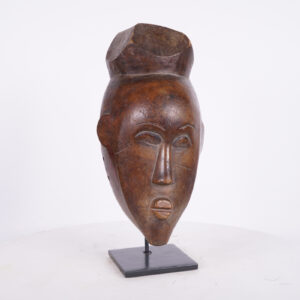
Baule Mask 12.75″ from Ivory Coast with Stand – African Tribal Art
$175.00View More -
Sale!
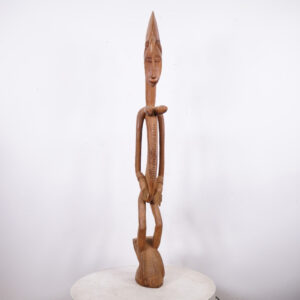
Baule Style Female Figure 45″ – Ivory Coast – African Tribal Art
$95.00View More -
Sale!
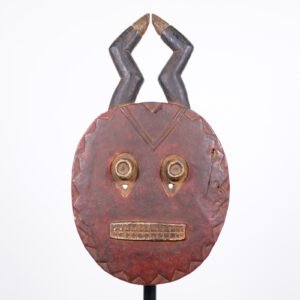
Intriguing Baule Goli African Mask 16.5″ – Ivory Coast – Tribal Art
$62.50View More -
Sale!
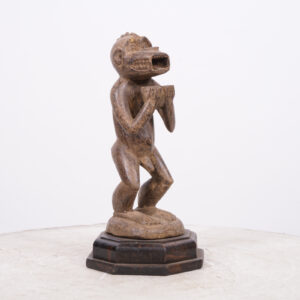
Baule Mbra Gberke Monkey Statue on Base 11″ – Ivory Coast
$112.50View More -
Sale!
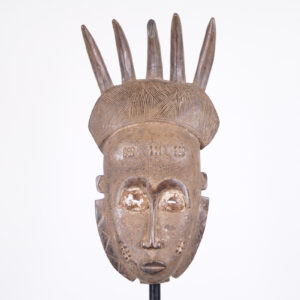
Baule Horned Mask 18.5″ – Ivory Coast – African Tribal Art
$75.00View More -
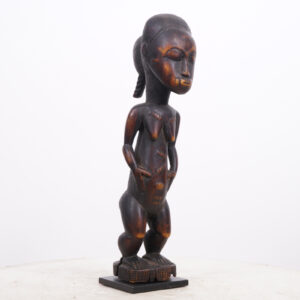
Beautiful Baule Female Figure on Base 15.75″ – Ivory Coast – African Tribal Art
$175.00View More -
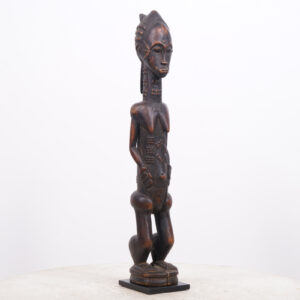
Baule Female Figure on Base 19″ – Ivory Coast – African Tribal Art
$225.00View More -
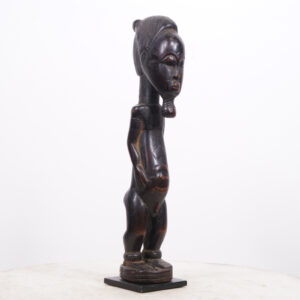
Baule Male Figure on Base 17.5″ – Ivory Coast – African Tribal Art
$195.00View More

